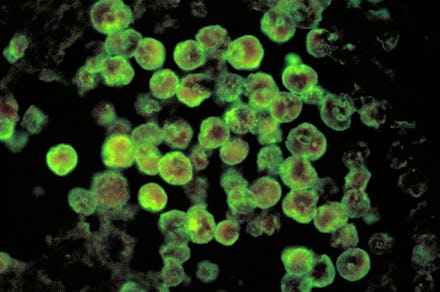Brain-Eating Amoeba Most Likely Killed Teen on a Rafting Trip — How Safe Is River Water?

Health officials are inspecting the U.S. National Whitewater Center in Charlotte, North Carolina, after 18-year-old Lauren Seitz died Sunday from a fatal infection likely caused by a rare brain-eating amoeba, which they believe she contracted when rafting there during a church trip, according to the Charlotte Observer.
Health officials found the amoeba Naegleria fowleri in Seitz's cerebral spinal fluid. The amoeba ultimately gave her primary amebic meningoencephalitis, a deadly brain infection.
Seitz's "only known underwater exposure was believed to be when riding in a raft with several others that overturned" at the whitewater center, the North Carolina Department of Health and Human Services reported, according to CNN.
How dangerous is Naegleria fowleri?
Naegleria fowleri, a single-celled amoeba, lives in freshwater and soil, and enters the swimmer's body through the nose, according to the U.S. Centers for Disease Control and Prevention. It thrives in warmer places, such as in the southern United States. Symptoms such as nausea and headaches, occur within nine days of the contraction. In about five days, death typically follows.
Although deadly, infection from Naegleria fowleri remains very rare. From 2006 to 2015, the CDC has reported 37 infections. All of them were deadly.
As far as the risk of infection, the CDC states:
You cannot be infected with Naegleria fowleri by drinking contaminated water. In very rare instances, Naegleria infections may also occur when contaminated water from other sources (such as inadequately chlorinated swimming pool water or contaminated tap water) enters the nose, for example when people submerge their heads or cleanse their noses during religious practices, and when people irrigate their sinuses (nose) using contaminated tap water. Naegleria fowleri has not been shown to spread via water vapor or aerosol droplets (such as shower mist or vapor from a humidifier).
The U.S. National Whitewater Center said in a statement that its water is treated with both filtration and also ultraviolet radiation. It also said a third-party tests the water every week. The center has remained open.
But regular water testing doesn't equate to safe water, since it can be contaminated at any time and by many causes. "It can be fine one minute and have (soil) runoff the next," Marcus Plescia, director of the Mecklenburg County Health Department, said, according to the Charlotte Observer. Many times, medical experts are unable to determine why certain people become infected and others don't, he added.
"Any time you go into a lake or pond, there are things in the water that can cause illnesses," Plescia said.
Read more: